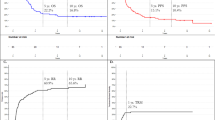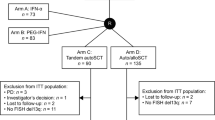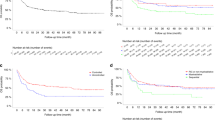Abstract
Multiple myeloma is still an incurable disease. The standard conventional chemotherapy comprises melphalan and prednisone (MP). Combination chemotherapy regimens could not improve the median survival of 36 months observed with MP. In the French IFM90 study, HD therapy with TBI plus melphalan 140 mg/m2 was shown to prolong overall survival and progression-free survival compared to conventional treatment. Nonetheless, most patients eventually succumb due to disease progression. Allogeneic transplantation may induce long-term remissions and even cure, but is hampered by a high transplantation-related mortality (TRM). Currently, efforts are made to reduce this TRM and to evaluate the graft-versus-myeloma effect. Bone Marrow Transplantation (2000) 25 , Suppl. 2, S25–S26.
This is a preview of subscription content, access via your institution
Access options
Subscribe to this journal
Receive 12 print issues and online access
$259.00 per year
only $21.58 per issue
Buy this article
- Purchase on Springer Link
- Instant access to full article PDF
Prices may be subject to local taxes which are calculated during checkout
Similar content being viewed by others
Author information
Authors and Affiliations
Rights and permissions
About this article
Cite this article
Goldschmidt, H., Egerer, G. & Ho, A. Autologous and allogeneic stem cell transplantation in multiple myeloma. Bone Marrow Transplant 25 (Suppl 2), S25–S26 (2000). https://doi.org/10.1038/sj.bmt.1702348
Published:
Issue Date:
DOI: https://doi.org/10.1038/sj.bmt.1702348
Keywords
This article is cited by
-
Prognostic factors for donor lymphocyte infusions following non-myeloablative allogeneic stem cell transplantation in multiple myeloma
Bone Marrow Transplantation (2006)
-
Optimizing the use of anti-interleukin-6 monoclonal antibody with dexamethasone and 140 mg/m2 of melphalan in multiple myeloma: results of a pilot study including biological aspects
Bone Marrow Transplantation (2005)



